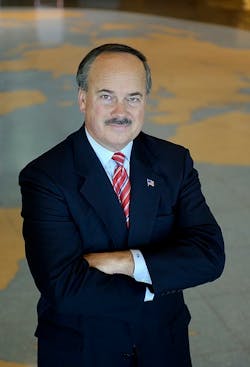In A Conversation With Thomas Kinton ...
Former Massachusetts Port Authority CEO for five years and director of aviation for 13 years, Thomas Kinton spent 35 years at Massport in a variety of positions, the most prominent being director of operations under Jane Garvey, who later became head of the FAA.
There's a lot of history in that tenure — the good, the bad, and the ugly, relates Kinton. He was there during 9/11, and lost two airplanes that took down the World Trade Center buildings; he was right in the middle of the sea change that occurred in aviation security as a result of the attacks; and he oversaw the complete rebuild of Logan Airport, on top of itself — a $4.5 billion undertaking involving a multitude of challenges with regard to keeping the airport open and operational during that time.
Also while at Massport, Kinton and officials permitted a new runway at Logan, and facilitated what has become a very successful operation for JetBlue Airways, which is now the number one carrier out of Boston with regard to daily departures.
Regarding his capacity as a consultant — it will be a year in September since he launched Kinton Aviation Consulting, where he represents a number of companies, including: as a board member of Cape Air; an aviation advisor for Gilbane, a worldwide construction company; a senior aviation advisor for Parsons Brinckerhoff on the design side; and an advisor for SH&E.
Kinton works with airports both big and small, such as the Midfield Terminal project in Abu Dhabi — a 75-wide-body gate and terminal project that includes some $10-14 billion worth of construction — to the Briscoe Field privatization initiative for the Gwinnett County board in Georgia to help in its decision making process.
“The way I’ve designed [the company] is to have a stable, if you will, of highly qualified companies … that if something is bigger than I am, I can bring these firms together as a joint-venture, or I can recommend them.”
Kinton says you have to have a global perspective today because aviation is a global industry. This is especially true when considering modern airline economics. Among concerns in the airline industry, global terrorism remains high on the list due to the potential damage that can be done to the world economy by disrupting commercial air transport, he explains. Cost of fuel and economic concerns also remain very important issues for carriers.
Comments Kinton, "The recapitalization of the airline industry from an aircraft standpoint is also a big concern for airlines. Carriers are placing multi-billion dollar orders for more fuel-efficient aircraft to address high fuel costs.
"How do you deal with high-fuel? You consolidate — you consolidate routes, you buy a refinery maybe … and you get your load factors up in the high 80s and low 90s.
"I think the industry is doing a good job of figuring that out."
Airlines are trying to determine how to get size, says Kinton. Delta sort of set the paradigm, and United followed. "We have this American/US Airways debate going on, and my sense is you will see a merger there. You have to … who is left out there size-wise that makes sense?"
With regard to foreign competition, Kinton says carriers need size, but they also need the ability to get even bigger … which drives the debate about foreign ownership. "How do you, as a domestic carrier, compete with an airline like British Airways, who has the ability to move across borders and make themselves bigger," he asks. Here, Federal law prohibits that, and the airlines are making a case that that needs to change.
On the topic of new aircraft orders, follow the money, says Kinton, and follow who is actually taking delivery of aircraft. "The carriers that are doing this are the Gulf carriers — Emirates and Etihad to name two — who are creating huge global hubs. Certainly that’s not all O&D traffic … this is stimulation of the market, but it’s also stealing traffic."
That traffic is coming from somewhere, he adds. The traffic going over European hubs ... you may see some of that shifting to the Gulf states as a result of carriers trying to avoid the EU Emissions Trading Scheme over that part of the world.
Building For The Future
Airport infrastructure should be a primary concern for U.S. carriers, explains Kinton. Though, it doesn’t seem to be as airlines oppose a solution to the problem of a dwindling aviation trust fund to support airport infrastructure needs.
"The problem is that the Airport Improvement Program (AIP) will probably be cut going forward; there’s not enough in AIP right now to fund the capital needs of airports in this country," remarks Kinton. "The PFC (passenger facility charge) has been a great tool for airports to keep money on the airport, and it doesn’t end up going into the rates and charges.
"And here’s an airline industry that has no problem putting $25 and $50 fees on a ticket for a bag, and they’re opposing another three bucks on a $4.50 PFC to $7.50, which isn’t even keeping pace with inflation.
"There’s an alternative here — a lot of airports could do it — you could build these things you need to do and raise the rent and landing fee.
"A huge concern for airports is ‘how do we fund this infrastructure going forward,’ because it’s ever changing … the need is there for more efficiency and more terminals."
Concerning air service to smaller communities, Kinton comments, "I think airlines are doing a good job today, because fuel is making them pay attention to the bottom line. The days of “We are going to fly everywhere and compete everywhere with half-full airplanes” is over. You can’t do it.
"But that also leads to another concern, which is the loss of air service in various communities because airlines have pulled out … the cost of running regional jets — you’ve seen Delta saying no more Comair; is American going to spin off Eagle?
"When you see a Delta go to 100-seats now to better serve these smaller markets, I think that’s a good strategy based on efficiency and dealing with the cost of fuel, but I also think it spells trouble for the smaller markets that won’t fill a 100-seat airplane."
That led us to the Essential Air Service (EAS) program. 'Is this program going to survive in the future? Does it make sense to fund airport markets that can’t support themselves,' I asked Mr. Kinton.
He responds, "When you isolate the argument and talk about the Federal government subsidizing a seat into a particular market in this economy with trillions of dollars of debt … the argument is a tough one to make.
"When you look at the bigger picture, and look at what it does to the economy of those smaller markets, which are part of a growing national economy … and when you look at the broader picture, I think EAS should stay around. Otherwise, companies and people move out of those areas, and that creates other economic problems that far outweigh the cost to subsidize a particular flight."
The Prospects Of Private Airport Ownership
Says Kinton, "I think you have a lot of money worldwide on the sidelines and being looked at for places for it to work, and one of those places being looked at are airports. Some countries are doing privatization well and that has been moving forward for years.
"There are other groups who look at Briscoe Field as an opportunity to sort of put private money to work, and take advantage of a situation they see — a major city and the largest airport in the world with no secondary airport. Most major cities have a secondary airport.
"Private operators said they would take the responsibility of putting their capital up, and the onus was on them to bring airlines in to a smaller operation — 8, 10, or 12 gates or so — that would be specifically designed to handle the O&D market north of Atlanta," relates Kinton.
"That was a very well thought-out idea, but the community made the decision I think because they didn’t want the noise and congestion that go with it, not because the business plan was bad."
Kinton sees at least a hybrid of this starting to occur in New York, where they are doing it on an individual terminal basis. There is more to come on airport privatization in the U.S. going forward, he says. "There are a lot of people who want to play in this space, and have the capital to do it … but if the opportunity doesn’t exist, that capital is going to go elsewhere."
Thanks for your interest,
BDM
About the Author

